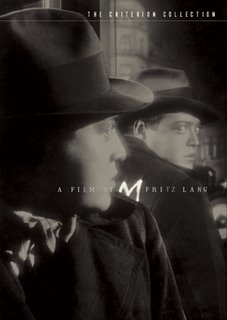
Fritz Lang's highly influential career as a film director began in post World War I Germany, where he was a leading figure in the German Expressionist film movement, and ended in the United States in 1953 with the production of The Big Heat, a film noir classic. Perhaps his greatest film, M (Germany, 1931) forms an historical bridge between expressionism and film noir. Like the former it uses strange and disturbing compositions of light and dark in order to symbolize the inner workings of the human mind; like the latter it more realistically sets its story in a modern urban setting and blends in sociological issues along with the psychological and moral ones.
M was the first psychological thriller of the cinema. Based on the real crimes of the "Monster of Dusseldorf" Peter Kurten who was put the death the year this film was released.
M was the first psychological thriller of the cinema. Based on the real crimes of the "Monster of Dusseldorf" Peter Kurten who was put the death the year this film was released.
According to crime historians Kurten is one of the most evil, depraved and disgusting criminals of all time. The character played by Peter Lorre, Hans Beckert was portrayed as a more sympathetic person. One of the details about this film that makes it unique even among todays thrillers is that the movie is more about the actions and reactions made by society rather than delving into the lifestyle of the serial killer like "Henry: Portrait of a Serial Killer".
In pure cinematic ingenuity Lang smoothly cuts back and forth between the police and the criminal underground as they both strive for the same ultimate goal, find the killer. One of the many thrilling things about this film is as an audience member you are on edge about Beckert killing another child as well as wanting to know if it will be the police who capture Beckert or the criminal underground, plus what will either side do once they capture him. Another part of Lang's brilliant film-making is that he does not make it mellow dramatic.
This was still the beginning of the sound era and many film makers through out the world thought that there should never be silence on the screen. Showing how far ahead he was of his time he took the opportunity to go without music and simply let the streets and crowds play as the soundtrack.
This film is one of a kind and not only should every film fanatic own this film but anyone who is a fan of the art form.



No comments:
Post a Comment